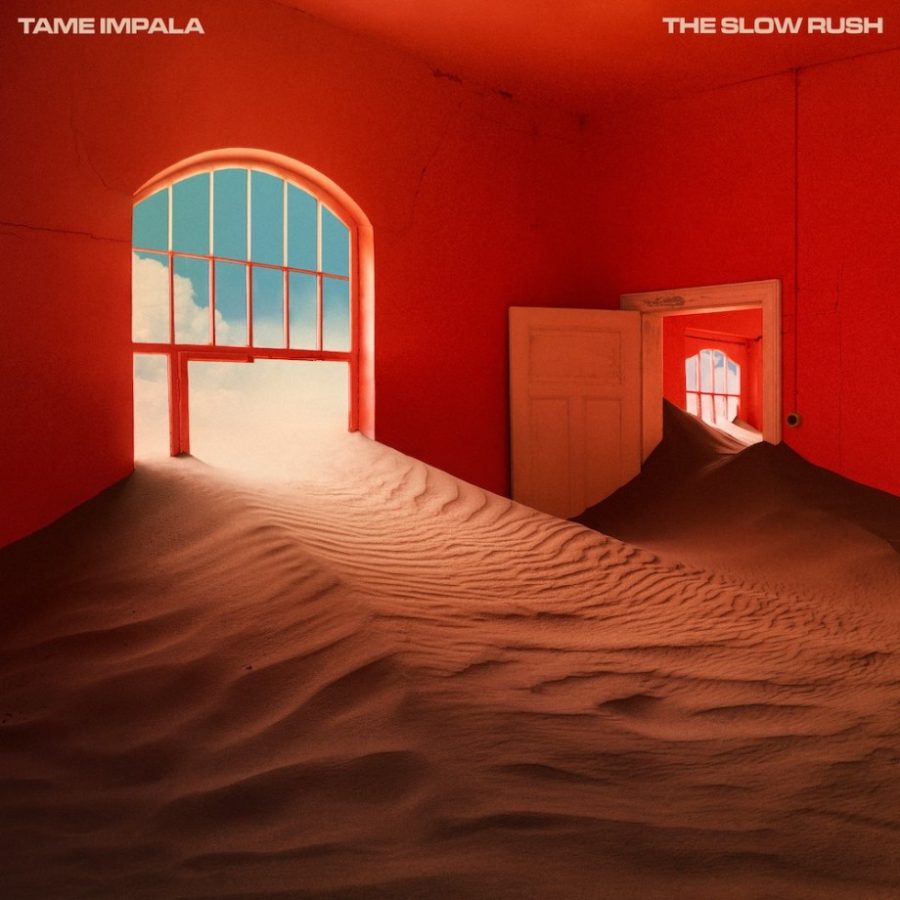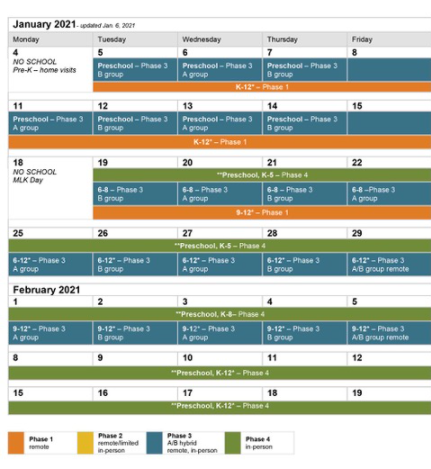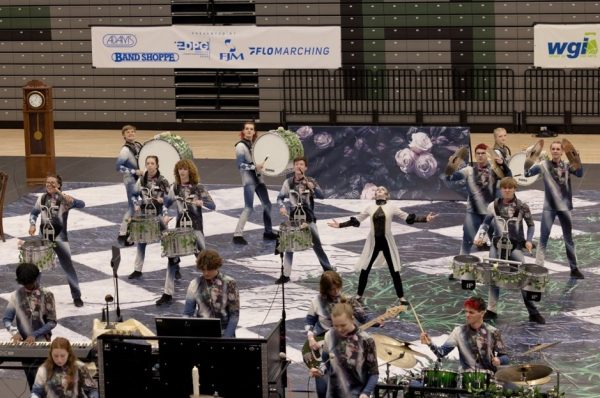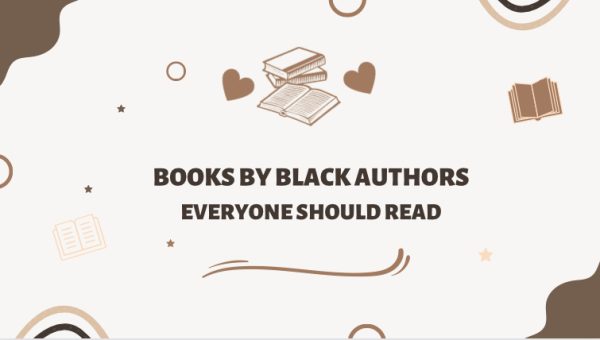Review: Tame Impala perfects his style in The Slow Rush
The Slow Rush, Tame Impala’s fourth album and first since 2015, was released on Friday, February 14.
On Friday, February 14, Kevin Parker, better known as Tame Impala, released his fourth and newest album, entitled The Slow Rush. The album was his first since the release of his third album in 2015, Currents, and it immediately became apparent upon listening that he had a clear cut idea before even beginning to work on the album. From start to finish, the album was centered around something that is often thought about and would resonate with everyone, no matter the listener: time.
I have personally been listening to Tame Impala since I was recommended the song The Less I Know the Better almost three years ago. It is a popular one—one that almost every single person I ask has heard of—but the release of The Slow Rush marked a change in Tame Impala’s vision. While listening for the first time, I could easily envision the story Parker was trying to tell: one of traveling toward something new and feeling free from nostalgia and anything holding him back.
Despite The Slow Rush and all of Tame Impala’s projects being the product of Parker, he has a “touring band,” with Jay Watson, Cam Avery, Dominic Simpler, and Julien Barbagallo. In an interview with Evening Standard in June of 2018, he explained the concept, sharing that he “was just shy. [He] thought if people saw a bunch of guys with long hair in the picture they’d enjoy it more. [Parker] didn’t think [he] had anything to offer as a solo artist.” So, he created a band to be able to perform in live shows, such as when he was a headliner at Coachella in April of 2019. Regardless, the songs that Tame Impala releases are all written, performed, and recorded by Parker, and his unique sound has only become more clear over time.
On the evening that the album was released, I took advantage of being in a state with Mountain Time and began listening as soon as the album came out at 10:00 P.M. Even before the release though, listeners could begin getting an idea of Parker’s newest work through his singles from the album, Borderline, Posthumous Forgiveness, It Might Be Time, and my personal favorite of the singles, Lost in Yesterday.
The album and song titles alone were enough to begin formulating a storyline throughout the album. Titles such as One More Year, Tomorrow’s Dust, On Track, and One More Hour quickly set the tone for the time-themed album Parker had created. The opening song One More Year, though not the strongest on the album, immediately creates a psychedelic atmosphere that is continued throughout the following songs. It captures Parker’s sound perfectly, showing off his unique combination of melodic tunes and ambitiously experimental ideas.

Kevin Parker performs live with his “touring band” at Sala La Riviera, a concert hall in Madrid, Spain.
The next two tracks, Instant Destiny and Borderline, go hand in hand, both with lyrics that simply scream “the future is here and we should make the most of it.” Instant Destiny has a slower, more innovative sound, exploring the pop-funk genre that Parker seemingly delves deeper into every time he releases a new project. Borderline opens with quicker beats and much more outwardly exciting melodies. I would consider it to be the first song on the album that can be described as very lively and upbeat—it is the kind of song that makes listeners want to get up and dance.
In statements that Parker provided for Apple Music, he breaks down the album song by song, offering insight and his thoughts on the past, present, and future. In regards to the opening triad of songs, he looks back upon his life, saying that he “just realized we were standing right here exactly one year ago, doing the exact same thing… Our book needs more chapters… I have a plan.” He also explores his feelings about nostalgia and being able to let go of those feelings. “The only thing special about the past is that it got us to where we are now. Free from feeling sentimental… the only way to see [the strange new world] is to be in it.”
His special outlook on the world and ability to look ahead in life rather than hold onto the past helps aid in the futuristic sound that much of his music is centered around—and that sound is on full display in Posthumous Forgiveness. The song opens with a slower pace, similar to Instant Destiny, but progresses around the chorus to a more intense, rhythmic beat. It becomes very obvious that these changes between more mellow and then stronger, hard-hitting beats was a conscientious decision by Parker. This sets the tone for when the entire song’s mood switches to a much more relaxed sound about two-thirds of the way through. It is a moment that first had me checking to see if I had skipped the end of the song entirely, but it feels oddly fitting. After a song with more intense beats throughout, having a few moments of calm at the end seems to fit it perfectly and it helps drive home Parker’s thoughts about accepting the past.
The next track is my favorite off of the album so far: Breathe Deeper. It is one of the more instrumentally focused tracks and it opens with piano samples in the background that make it one of the more grounded songs all throughout. It is one I would recommend to someone looking to get into Tame Impala or someone who does not love his futuristic sound as much. I find it has the perfect mixture of his classic style and more relaxed instrumentals, which all come together to make it the most enjoyable track on the album for me.

Tame Impala has announced tour dates for his new album and will be performing in North America, Australia, and New Zealand.
The next song, Tomorrow’s Dust, focuses completely on the future and how today’s actions impact tomorrow’s world. “Future memories are present-day current events. Tomorrow’s dust is in today’s air, floating around us as we speak,” explained Parker. The topic of the song is a visionary one, but the song sounds just as ambitious as its concept. It has a less psychedelic sound, even featuring some acoustic guitar, but Parker remains true to his experimental style. One of the things I think pulled the song together was the first ten and final thirty seconds, in which it sounds like the song being recorded from an outsider’s perspective. The more distant version of the song in the beginning and the end provides an interesting sense of closure to the listener, which I feel fits well with Parker’s themes.
Similar to Instant Destiny and Borderline, I think On Track and Lost in Yesterday also go hand in hand. Though initially it could be seen as an odd pairing due to their near opposing tunes, their messages pair perfectly in my mind. On Track is a much slower song, more centered around vocals than the music itself. Lyrics like “One other minor setback / but strictly speaking, I’m still on track / And all of my dreams are still in sight,” are simply about keeping life in perspective and focusing on the big picture, because, as long as you are still on track, everything will be fine. Then, despite the pretty drastic change in sound from slower to much more exciting, Lost in Yesterday feels like a continuation of that message. “Nostalgia is a drug, to which some are addicted,” explained Parker. With a more upbeat style, Lost in Yesterday continues to focus on the need to keep looking forward in life rather than becoming fixated on the past, and both have quickly become two of my favorites on the album.
The ninth track, Is It True, seems almost reminiscent of a 1980s sound, with a more funk-based style. It is the type of song that reels the listener in almost as soon as it begins and leaves them wanting more when it ends. Is It True is one of the shorter songs on the album, and Parker’s somewhat nostalgia-based style on this track fills every second with a unique sound that can only be described as “groovy.” I also think the nostalgic style was very intentional, as the song is mainly focused on young love and the uncertainty of the future. It sounds like the soundtrack of an 80s coming-of-age movie and I do not think it could have fit its theme any better.
The next two songs are a wonderful continuation of one another and Glimmer adds onto the storyline that It Might Be Time brings to center stage. Parker explains that It Might Be Time is “a message from your negative thoughts: ‘Give up now… It’s over.’” And then, Glimmer is exactly what it seems: “a glimmer of hope. A twinkle. Fleeting, but unmistakable. Promising.” It Might Be Time is self-doubt wrapped in a fun, lively song, that shows how Parker decided that he “may as well embrace [himself]” and ignore all of the doubt he feels. Glimmer is the shortest song on the album, yet it seems to be the perfect encapsulation of Parker’s fleeting moment of hope. It feels as if the song is over as soon as it starts, and, similar to Is It True, it leaves me wishing there were more.

Parker’s psychedelic sound is only enhanced during his live shows, with colorful background visuals and lights throughout the venue.
The final song on the album, One More Hour, is aptly titled to parallel the album’s opening song, One More Year. Before even reading Parker’s explanation of his vision on this song, or even listening to the song, I felt that I was familiar with what message he wanted to portray. The correlation between the titles mostly gives it away; while at the beginning of the album, Parker was creating a plan and beginning to move on in life, now, at the end of the album, he is ready to face the future head-on. To me, the message and connection between the titles feel like the perfect way to conclude the album and the song itself is a masterful conclusion. It is a song that has all different types of beats and melodies, and it takes the listener on a quick journey through the album’s storyline. It perfectly encompasses Parker’s sound and the story he wanted to tell throughout the album, and I feel that it ended the album on the perfect note.
The Slow Rush was an album that I had been excitedly awaiting since it was announced in October, and it easily met and exceeded any expectations that I had. While some songs were stronger than others, each and every track had its own unique sound, which only aided in the creation of Tame Impala’s individualistic style.
Since it was released, I have had the album on repeat and I will continue to, as each song proves how Parker has fully come into his own as an artist and has mastered his style. The Slow Rush is a nearly perfect album; one with a story and a fantastically ambitious sound as well as incredible vocals and lyrics. I think this album was a home run in every aspect and, in the simplest terms, it not only deserves to be, but it demands to be heard.
Your donation will support the student journalists of Fossil Ridge High School. Your contribution will allow us to purchase equipment and cover our annual website hosting costs.

Melissa May, a senior, is ecstatic to be starting her fourth year as an Etched in Stone staff member. She is excited to be back writing for the newspaper and is optimistic heading into the semester despite the unusual circumstances. She is thrilled to take on the role of Editor in Chief alongside Caroline...














